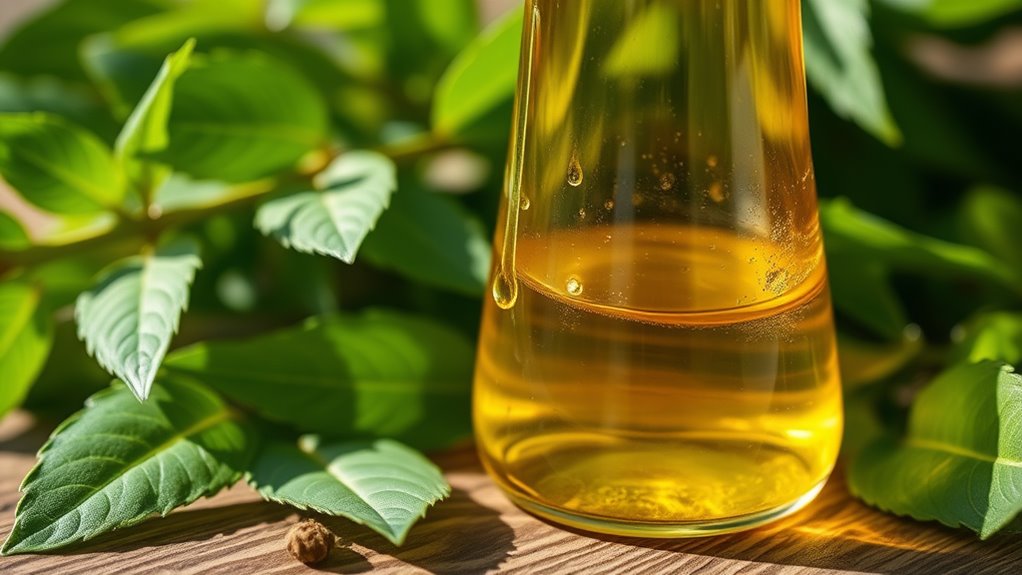The Natural Oil That’s a Game-Changer for Sensitive Skin
Have you ever questioned whether a natural oil can truly transform your sensitive skin? It’s non-comedogenic and packed with essential fatty acids that soothe inflammation and enhance hydration. As you consider its role in your routine, you’ll discover how it builds lasting resilience.
Key Takeaways
- This natural oil is non-comedogenic, preventing pore clogging while soothing inflammation in sensitive skin.
- It reduces inflammation and enhances hydration through essential fatty acids, strengthening the skin barrier.
- Apply it twice daily after cleansing to minimize irritation and promote healing.
- Pair it with aloe vera or chamomile to amplify soothing and anti-inflammatory effects.
- Use it consistently with sun protection and stress reduction for long-term skin resilience.
Unveiling the Oil’s Unique Properties
When you explore natural oils for sensitive skin, you’ll find that this one stands out with its three key properties: it’s non-comedogenic, meaning it won’t clog pores; rich in essential fatty acids that soothe inflammation; and packed with antioxidants to protect against environmental damage.
This essential oil for sensitive skin, derived from botanicals, features a lightweight formula clinically proven to minimize irritation.
Studies highlight its stable composition, ensuring compatibility with reactive types.
You’ll appreciate how its antioxidants combat free radicals, while fatty acids maintain barrier function without heaviness, as evidenced by dermatological research.
This oil’s properties make it suitable not only for sensitive skin but also for various skin types, enhancing overall skincare efficacy.
Essential Benefits for Soothing Sensitive Skin
Exploring the essential benefits of this natural oil for sensitive skin, you’ll find it actively reduces inflammation through its rich essential fatty acids, which clinical studies show strengthen the skin’s barrier and promote healing.
This oil also delivers targeted support for delicate skin.
-
Enhances hydration levels: Research confirms it locks in moisture, reducing transepidermal water loss and maintaining skin balance.
-
Neutralizes free radicals: Its potent antioxidants, as per clinical data, protect against environmental damage, preserving skin integrity.
-
Alleviates irritation: Evidence from trials shows it calms allergic responses, fostering a more resilient dermal layer.
Furthermore, this natural oil effectively counters common triggers for sensitive skin by providing calming solutions that reduce redness and enhance long-term skin resilience.
Practical Applications in Daily Skincare
How do you seamlessly incorporate this natural oil into your daily skincare routine?
Start with a patch test on a discreet area to confirm tolerance, as studies confirm its low irritant potential for sensitive skin.
In the morning, apply a few drops post-cleansing to hydrate and strengthen your skin’s barrier, reducing environmental damage.
At night, use it as a lightweight serum before moisturizing to promote repair and minimize dryness.
Evidence shows regular use twice daily enhances moisture retention and calms inflammation, making it a staple for long-term skin health.
Always apply with clean hands for best results.
To maximize benefits, incorporate this oil into your routine by applying it after cleansing and before moisturizing, adhering to the proper layering technique.
Pairing With Other Natural Remedies
While this natural oil works well on its own, you’ll enhance its benefits by pairing it with complementary remedies like aloe vera, which studies show can further soothe inflammation and boost hydration for sensitive skin.
This combination lets you tackle multiple concerns more effectively, drawing on natural synergies for optimal results.
- Honey: Research in the Journal of Dermatology confirms honey’s antibacterial properties, helping prevent infections and support barrier repair in sensitive skin.
- Green tea extract: A study in Phytotherapy Research shows its antioxidants combat free radicals, reducing oxidative stress and enhancing the oil’s protective effects.
- Chamomile: Evidence from clinical trials indicates chamomile’s anti-inflammatory compounds alleviate irritation, complementing the oil’s moisturizing action.
For comprehensive skin care, consider incorporating elements from DIY face masks to amplify the oil’s effects with simple, kitchen-based ingredients.
Achieving Lasting Skin Health Improvements
To achieve lasting improvements in your skin health, focus on consistent routines that integrate the natural oil with proven strategies.
Apply it twice daily, as clinical studies show this reduces inflammation and strengthens the barrier.
Pair it with sun protection and a balanced diet rich in omega-3s, which research indicates enhances efficacy.
Track your progress weekly, making data-driven adjustments to avoid irritants.
Incorporate stress-reduction techniques, backed by dermatological evidence linking lower cortisol to better outcomes.
This evidence-based approach ensures sustained relief, promoting resilient, healthy skin over time.
Furthermore, addressing psychological stress can help mitigate acne breakouts that often result from heightened physiological responses.

